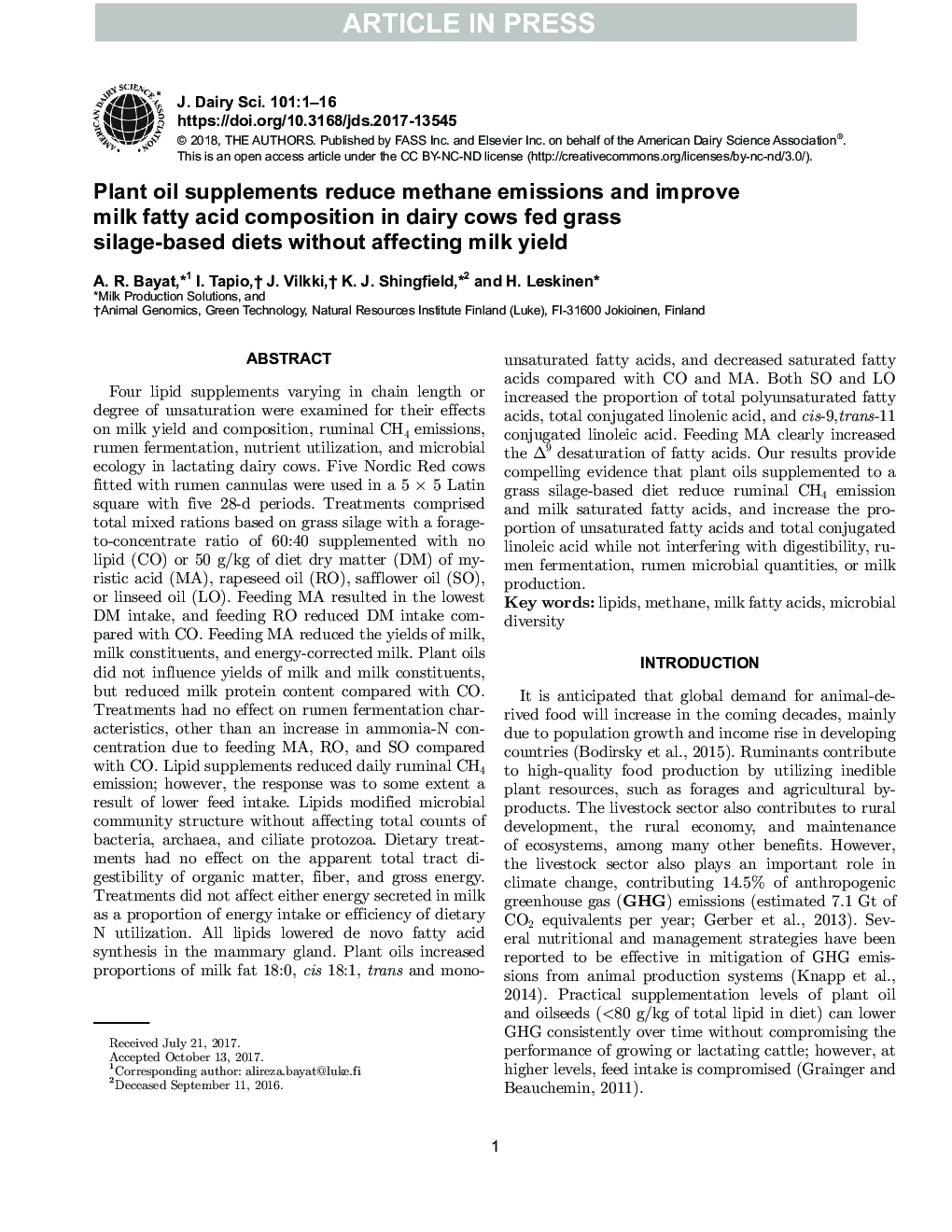| کد مقاله | کد نشریه | سال انتشار | مقاله انگلیسی | نسخه تمام متن |
|---|---|---|---|---|
| 8501553 | 1553843 | 2018 | 16 صفحه PDF | دانلود رایگان |
عنوان انگلیسی مقاله ISI
Plant oil supplements reduce methane emissions and improve milk fatty acid composition in dairy cows fed grass silage-based diets without affecting milk yield
ترجمه فارسی عنوان
مکمل های گیاهی روغن باعث کاهش میزان انتشار متان و بهبود ترکیبات اسید چرب شیر در گاوهای شیری می شود که از رژیم های غذایی مبتنی بر سیلاژ چمن بدون تاثیر بر عملکرد شیر استفاده می کنند
دانلود مقاله + سفارش ترجمه
دانلود مقاله ISI انگلیسی
رایگان برای ایرانیان
کلمات کلیدی
لیپید ها، متان، اسید چرب شیرین، تنوع میکروبی،
موضوعات مرتبط
علوم زیستی و بیوفناوری
علوم کشاورزی و بیولوژیک
علوم دامی و جانورشناسی
چکیده انگلیسی
Four lipid supplements varying in chain length or degree of unsaturation were examined for their effects on milk yield and composition, ruminal CH4 emissions, rumen fermentation, nutrient utilization, and microbial ecology in lactating dairy cows. Five Nordic Red cows fitted with rumen cannulas were used in a 5 Ã 5 Latin square with five 28-d periods. Treatments comprised total mixed rations based on grass silage with a forage-to-concentrate ratio of 60:40 supplemented with no lipid (CO) or 50 g/kg of diet dry matter (DM) of myristic acid (MA), rapeseed oil (RO), safflower oil (SO), or linseed oil (LO). Feeding MA resulted in the lowest DM intake, and feeding RO reduced DM intake compared with CO. Feeding MA reduced the yields of milk, milk constituents, and energy-corrected milk. Plant oils did not influence yields of milk and milk constituents, but reduced milk protein content compared with CO. Treatments had no effect on rumen fermentation characteristics, other than an increase in ammonia-N concentration due to feeding MA, RO, and SO compared with CO. Lipid supplements reduced daily ruminal CH4 emission; however, the response was to some extent a result of lower feed intake. Lipids modified microbial community structure without affecting total counts of bacteria, archaea, and ciliate protozoa. Dietary treatments had no effect on the apparent total tract digestibility of organic matter, fiber, and gross energy. Treatments did not affect either energy secreted in milk as a proportion of energy intake or efficiency of dietary N utilization. All lipids lowered de novo fatty acid synthesis in the mammary gland. Plant oils increased proportions of milk fat 18:0, cis 18:1, trans and monounsaturated fatty acids, and decreased saturated fatty acids compared with CO and MA. Both SO and LO increased the proportion of total polyunsaturated fatty acids, total conjugated linolenic acid, and cis-9,trans-11 conjugated linoleic acid. Feeding MA clearly increased the Î9 desaturation of fatty acids. Our results provide compelling evidence that plant oils supplemented to a grass silage-based diet reduce ruminal CH4 emission and milk saturated fatty acids, and increase the proportion of unsaturated fatty acids and total conjugated linoleic acid while not interfering with digestibility, rumen fermentation, rumen microbial quantities, or milk production.
ناشر
Database: Elsevier - ScienceDirect (ساینس دایرکت)
Journal: Journal of Dairy Science - Volume 101, Issue 2, February 2018, Pages 1136-1151
Journal: Journal of Dairy Science - Volume 101, Issue 2, February 2018, Pages 1136-1151
نویسندگان
A.R. Bayat, I. Tapio, J. Vilkki, K.J. Shingfield, H. Leskinen,
